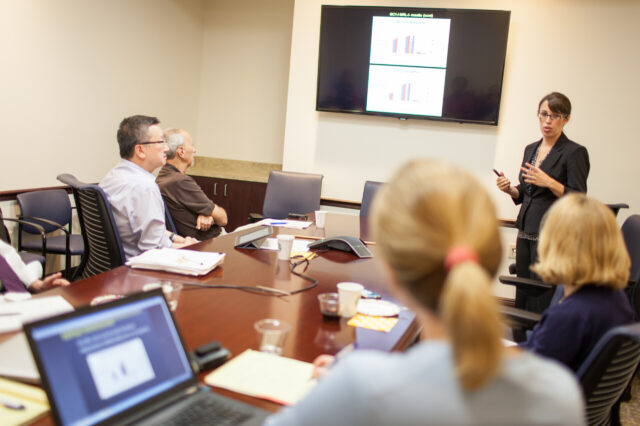UF Health researcher receives grant to combat severe form of childhood blindness

It’s usually in the first few months that parents of newborns with Leber congenital amaurosis realize something is wrong. The babies fail to focus on their parents’ faces, may be abnormally sensitive to light or have unusual eye movements. Parents then receive the devastating diagnosis: severe, permanent visual impairment.
A new grant allows University of Florida researcher Shannon Boye, Ph.D., and colleagues at the University of Pennsylvania, to test a gene therapy that could potentially reverse one form of this hereditary disorder.
“I have interacted with many parents of these young patients, and they’re devastated — it pulls on your heartstrings,” said Boye, an assistant professor of ophthalmology in the UF College of Medicine.
Leber congenital amaurosis, the most common cause of childhood blindness, is a group of degenerative diseases of the retina caused by genetic mutations in one of 19 genes currently associated with the disorder. These genes encode proteins that play a variety of roles in the development and function of the retina, and a mutation in any one of them can cause visual impairment.
Boye and her colleagues are currently focused on one of these genes — retinal guanylate cyclase 1, known as GUCY2D. According to the National Institutes of Health, of the 3,000 people in the U.S. who have Leber congenital amaurosis, approximately 15 percent carry mutations in GUCY2D, making this a leading form of the disease.
This particular mutation occurs in photoreceptors, cells in the retina that convert light into electrochemical signals that the brain interprets as vision.
“When this gene is mutated, the photoreceptors essentially become sick,” Boye said. “Therefore, the patients cannot properly respond to incoming light and are severely visually impaired.”
The $900,000, three-year grant from the biotechnology company Genzyme will allow Boye to build on a gene therapy method previously developed by UF ophthalmology researchers who successfully treated another form of Leber congenital amaurosis in 2008.
The method involves supplying patients with a normal, non-mutated copy of the GUCY2D gene. The researchers will accomplish this by taking a naturally occurring virus, adeno-associated virus, removing its viral DNA and replacing it with a normal copy of GUCY2D. An injection of these viral particles into the retina will then deliver GUCY2D to photoreceptors and potentially restore their function.
“It’s a gutted virus,” Boye said. “It’s already proven to be very safe and effective in clinical trials for two other forms of inherited retinal disease.”
Pre-clinical studies are currently underway, during which Boye’s team will perform experiments designed to achieve FDA approval for using this form of gene therapy in patients. Specifically, they will focus on identifying the most effective adeno-associated virus and dose for safely delivering GUCY2D.
Boye initially began work on the GUCY2D mutation a decade ago as a graduate student at UF. She and her colleagues have demonstrated that gene replacement can restore vision in four different animal models of this disease.
Prior research by colleagues at the University of Pennsylvania suggests that even older individuals with the GUCY2D mutation may be good candidates for this therapy, as patients with this disease tend to retain normal photoreceptor structure across a wide expanse of their retinas.
“We have a mountain of proof-of-concept data showing that GUCY2D gene replacement works,” Boye said. “Taken together with clinical data showing that photoreceptors are relatively preserved in patients with this form of blindness, we believe there is a very strong rationale for treating the disease this way.”
The Genzyme grant supplements current funding from the Foundation Fighting Blindness to principal investigator William Hauswirth, Ph.D., a UF professor of ophthalmology, and Boye, co-principal investigator, and their longtime clinical colleagues at the University of Pennsylvania, Samuel Jacobson, M.D., Ph.D., and Artur Cideciyan, Ph.D.
About the author
